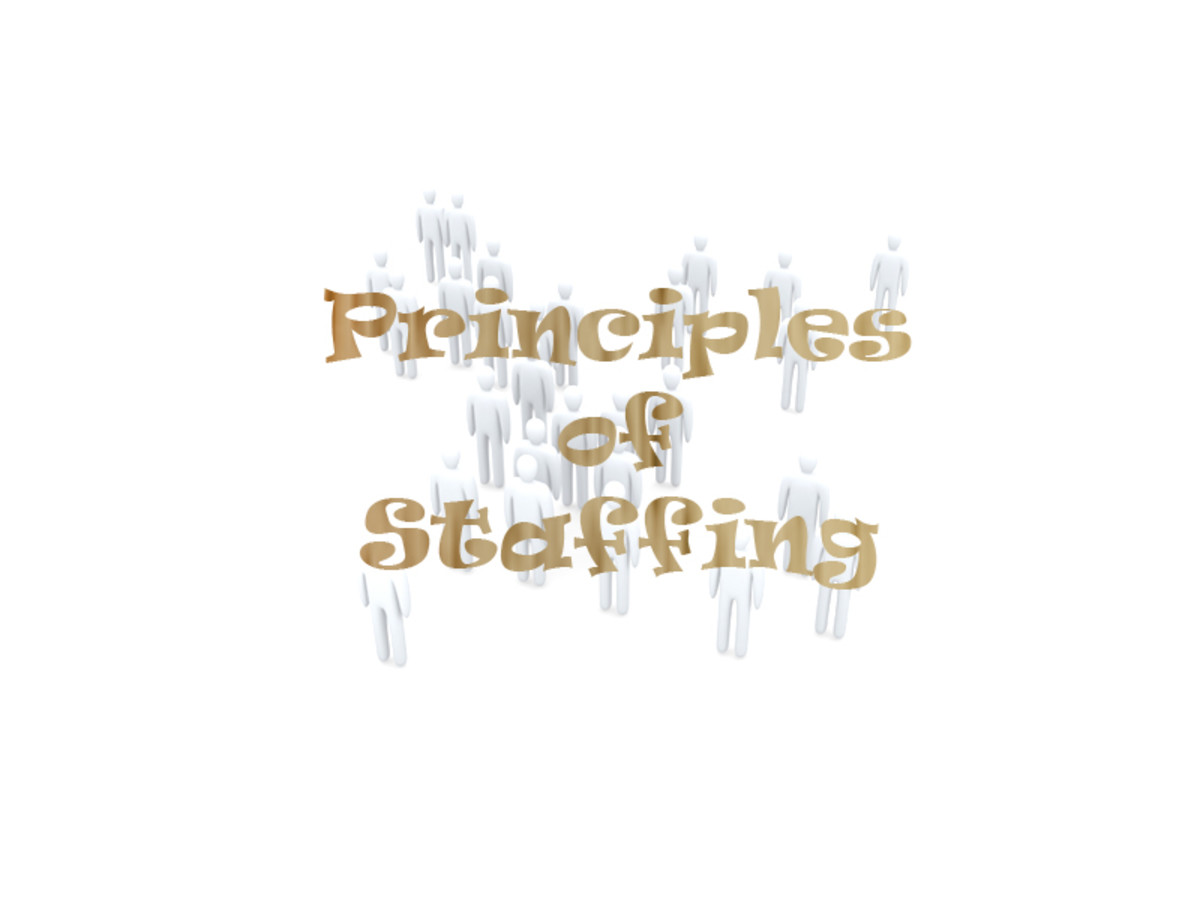How to Conduct Job Interview: A Guide for Managers and Supervisors

Author's Experience
I have been a supervisor for over 10 years and have performed many job interviews.
Conducting a Perfect Job Interview
Conducting a job interview can be just as stressful for you as it is for the applicants that are going to be in the job interview. The only tools you think you have at your disposal to evaluate the person is their application, resume, and the interview itself.
Preparing for the interview is a crucial step that some people overlook, resulting in a disastrous interview. This article will fully prepare you in conducting a successful job interview.
Have you ever been in a job interview where the those interviewing you were improperly prepared?

Before Conducting a Job Interview
These are the steps you should follow in preparing for a job interview.
- Review the basics about the organization to prepare for the interview. This advice works both ways. Even though you are on the inside and should know the basics of the job and organization, you need to refresh yourself in those basics to prepare for any questions the applicant may ask. If the applicant sees you don't care enough to know about the position and organization, they may not want the job.
- Read each applicant's resume and application prior to the interview. Don't start reading the applicant's resume during the interview, as it will demonstrate that you are not paying attention to them during the interview. This can even be done between interviews if you wish so the information is fresh in your mind.
- Plan out your questions ahead of time. You will want to prepare a list of questions to ask each applicant to offer everyone a fair and level playing field. While you will base your decision on their resume and the answers to their questions, you have to ask each applicant the same questions unless they open the door to other topics. For more on this, see the chart below on the do's and don'ts of interview questions.
- Pick a location to conduct the interview. Try to do this in a neutral location, like a conference room. If that's not possible, then do it in a location where the phone can be shut off or ringer turned low. Ensure the room is clean and organized to prevent distractions.
- Find at least one other person to conduct the interviews with. Having someone else with you to conduct the interview will help you in a few different ways. First, you can ask the other person to provide interview questions. Second, if you ask questions back and forth, you can study and listen to the person's responses more effectively when you are not asking a question. Lastly, once the interview is concluded, you can ask the other person what they thought of the applicant and get their input.
- Don't overload the applicant with multiple people conducting the interview. In one interview I was on I had seven people asking me questions. That is just way too many people. You could be making the applicant more nervous than they already are. Plus, you will have to contend with multiple opinions of the applicant. If they are all conflicting that could be trouble.
Tips on Conducting a Job Interview
Follow these tips when you are conducting a job interview.
- Don't make the job applicant wait any longer than you have to. This means planning enough time for each interview. You want to demonstrate that your organization is focused on timeliness. In addition, you will be able to see if the applicant showed up on time for the interview, which is a crucial first step in the interview process.
- Tell the applicant about the job. Even though there is a job title and general description on the application, it may not be specific to the actual position being interviewed for. Explain the job duties they would be performing so they know what to expect from the interview questions.
- Put all of the focus on them. Shut your phone off, close your e-mail, etc. It doesn't matter if you already made your decision, you need to give each and every person your undivided attention.
- Don't judge a book by its cover. Don't assume someone is perfect just because they are dressed perfectly. On the flip side, someone may be a great for the position even if their look doesn't demonstrate that.
- Understand that the applicant will be nervous. Try to remember back when you had your first job interview. There is a good chance you were nervous. Most people are nervous during a job interview, so that should be forgiven if they give some unsteady answers.
- Don't act bored. This is one mistake I made during an interview. I placed my hand on my face to prop it up. I looked bored and I am sure it didn't come across very well. Don't act uninterested or bored in what the applicant has to say.
- Don't let your emotions speak for you. Some applicants will try to use sympathy to earn a position. Or may make statements that you will want to roll your eyes at. Don't react. Instead, maintain a positive, yet neutral, demeanor.
- Treat them with respect. No matter who the person is, their background, etc., treat the person with the respect they deserve. Applicants will appreciate that, and even if they don't get the job, they may try again in the future because of how you treated them.
- Give them a chance to ask any questions they want. Pay, benefits, etc. are fair questions to ask for any job. Give them the time to ask their questions, within reason. If they are smart, they prepared their questions ahead of time.
- Give them an opportunity to say what they want. At the end of the interview you should give them an opportunity to talk. Allow them to state why they are qualified for the position, to cover anything else that didn't come up in the interview, etc.
- Show the person around. When the interview is concluded, it doesn't hurt to show the person around the office and briefly go over what they will be doing. It will give them some insight into the job and give them a chance to turn it down if they see how the operation works. Watch their reaction to seeing the operation, as that will play a key role in your decision as well.
- Advise them when to expect an answer. Be upfront with the applicant. Tell them if you have multiple interviews and when you expect to have a decision.

The Do's and Don'ts of Interview Questions
Do's
| Don'ts
|
|---|---|
Ask each applicant the same questions to keep it fair.
| Don't ask about strengths or weaknesses. It's a generic question that results in poor answers.
|
Ask about job terminations to see if the applicant improved as a result of the termination.
| Avoid asking about children, religion, political affiliations, etc.
|
Have general questions about the position and situational questions.
| If asking multi-part questions, keep it to two parts. Don't do more than that as that is too much.
|
Look up interview questions on the internet to use that are relevant to the position.
| Don't copy questions found on the internet, as the applicants may have found them as well. Change them to be unique for the interview.
|
If necessary, ask follow up questions based on their responses.
| Don't ask too many open ended questions that would result in a variety of answers that won't be useful.
|
Funny Job Interview Story
I was once part of a panel interview. During our interviews we all saw a spider crawling around the office. I have a huge fear of spiders so that was distracting me the whole time. During one of the interviews I saw the spider scurry across the floor and stomped hard on it. It alarmed everyone and I apologized multiple times to the candidate for the disruption.
Was it unprofessional? Yes. Did it hurt the person's chances of securing the job? Not at all.
Is it easier to conduct an interview one-on-one or in a panel setting?

Interviewing Potential Supervisors and Managers
Interviewing supervisors is different than someone in a non-supervisory position. These tips should be used in conjunction with the tips above.
- Have someone at the same level be part of the interview process. Even if you will be supervising the applicant, it's critical to have someone at that level be part of the interview process. They can offer a good evaluation if the applicant is capable of the job.
- Nervousness shouldn't be a factor. This is the only exception to the rules above. Those who are expected to lead shouldn't be shy or nervous during a job interview. They need to demonstrate they can confront difficult situations calmly and with authority.
- When asking questions, focus more on what they would do as a supervisor. How they would handle a problem employee, their decision process, etc. Anyone can learn a job, but being a good supervisor can't be taught. You should also have scenario based questions to learn how the applicant would respond as a supervisor.
- Find out any bad traits the applicant may have. Once you discover those bad traits, you have to decide which ones won't be that detrimental in your organization. Line staff tend to watch what their supervisor does like a hawk. If they see them do something bad, they will assume it's okay and repeat the same behavior. Figuring out any bad traits ahead of time could save you a headache in the future.
- Advise them if they will be a working supervisor. A working supervisor is someone who may have to do the job of those below them. You don't want someone who wouldn't be willing to do the job of their subordinates. For them to effectively supervise they need to learn and know the job themselves.
Turning an Applicant Down for the Job
It's never fun telling someone they didn't get the job they interviewed for, but it's a necessary part of the job interview process.
- Contact the applicant as soon as possible. Don't wait. If you have made a decision, then let all of the other applicants know.
- Call the applicant to tell them they didn't get the job. Don't send a letter, e-mail, or do nothing at all. The applicant deserves a phone call to be told they didn't get the job.
- If asked, explain why they didn't get the job. This will help them in future job interviews, allow them to focus on what experience they need, etc.
The Phone Call After the Interview

What do you think is the best method to let someone know they didn't receive a job offer?
The Handshake Before and After an Interview

My Experiences on Conducting a Job Interview
Here are a few of my experiences regarding job interviews:
- I was conducting a job interview alone for a supervisory position. The applicant seemed excited and eager for the position, so I hired her. However, on her first day she seemed less enthusiastic, which progressed as time went on. Within a month she quit and went back to her old position. I did conduct the interview alone, so I wonder if having another person in the interview with me would have helped.
- I had an interview for a personal assistant position for a department head. The interviewer seemed flustered and rushed. She didn't introduce herself and I had to ask for her name. I wasn't impressed and didn't plan to accept the job at that point.
- I interviewed for a position for a job title I wasn't too familiar with, but I learned all about it before going to the interview. I even tailored my answers to fit that, but as the interview went on the questions weren't consistent with the title of the position. At the end I found out that the job was for something totally different, but for that same title. I should have been told that in the beginning. The worst part was that they didn't bother to contact me to tell me I didn't get the job.
Sure, it’s fun to chat with people with interesting backgrounds who seem to have a passion for your company. But a job interview is not a friendly chat. You need to determine whether candidates can really do the job. So ask them to prove it.
— Kathryn MinshewThis article is accurate and true to the best of the author’s knowledge. Content is for informational or entertainment purposes only and does not substitute for personal counsel or professional advice in business, financial, legal, or technical matters.
© 2012 David Livermore





